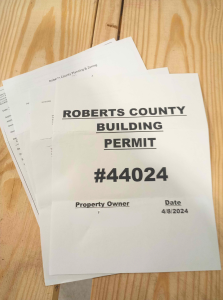Why Property Owners Should Obtain Their Own Permit
Back in the day, when I was a post frame building contractor, we always required our clients to obtain their own buildings permit. It wasn’t due to us being lazy, it was because if the building needed to be relocated on the site, or the permit office believed there was some conflict with utilities, property lines or other structures, the client could resolve the issues right then and there.
Here is an extreme sad tale which would never have occurred had the client obtained the building permit. This is from a story by Howard Greninger in the Terre Haute Tribune-Star.
“After getting materials delivered to build a large pole barn, Louis Wildman discovered a city building permit had been issued for the wrong property.
On Wednesday, he sought a zoning variance to allow a 30-foot by 60-foot pole barn be built on a lot he owns in the 600 block of Heinl Drive near South Sixth Street.
The zoning variance was denied 3-1.
 Wildman told the Terre Haute Board of Zoning Appeals he’s already spent $21,000 for materials for the pole barn. Wildman said he told a contractor it was up to the company to get a building permit. However, the contractor obtained a building permit for his home property on South 27th Street, not for the Heinl Drive property where he’d like to put the pole barn.
Wildman told the Terre Haute Board of Zoning Appeals he’s already spent $21,000 for materials for the pole barn. Wildman said he told a contractor it was up to the company to get a building permit. However, the contractor obtained a building permit for his home property on South 27th Street, not for the Heinl Drive property where he’d like to put the pole barn.
The board also discovered the property in question has other issues.
Ryan Wickens, with Vigo County Area Planning Department, said the property is 2,720-square-feet short of zoning requirements for a lot that would require a well. The lot, if submitted for a property subdivision and approved with property variances, can be developed, but at $150 per foot. It would require about $30,000 to extend a water line to the property, Wickens told the board.
Wickens said the department had an unfavorable recommendation. “A 30-by-60 pole barn will be out of character at this location,” Wickens told the board.
Wildman said he thinks the land has hardships that should be considered to allow him to build a pole barn, rather than a residential home as required under zoning.
“I feel it is an irregular lot. It is not a normal city lot,” Wildman said. “The water would cost so much to get there, and also the gas line runs down the center of Sixth Street, so I’d have to pay for gas to go over there, too. I don’t see where I financially can do that. If even someone wanted to build a house there, it would cost tens of thousands of dollars” to bring water, gas and sewer lines, he said.
Board member Jeff Ford asked how a “lot like that comes into existence.” Wickens said it is a “legal lot of record,” which has been on platted ground well before zoning was implemented. But because the lot is in the city limits of Terre Haute, it must conform to city zoning standards if further developed.
Vigo County Commissioner Brad Anderson said Heinl Drive is a dead-end street. “Most of that area is pretty much done with development. I don’t think anything like that [pole barn] would hurt that property,” Anderson told the board.
Wildman said he thinks the barn would increase property values.
However, adjacent property owners Wayne Jarvis and John Crowley disagreed.
Jarvis owns a rental home west of the property.
“The only thing it would be useful would be some type of commercial activity,” Jarvis said. “That pole barn would be big enough to run half a dozen plumbing vans out of or who knows what someone would do with it. I think it would be a high risk for a completely residential neighborhood.”
Crowley, who owns property to the southwest, said a building on his property is under investigation for arson, but he has plans to repair the building, which had been rental property.
“I talked to an appraiser who said this structure (pole barn) would be consider commercial and would greatly reduce the value of my property, substantially,” Crowley said.”
Mike the Pole Barn Guru comments:
My other caution, to prospective new post frame building owners, is to not have materials delivered until after a permit to build is in hand.






